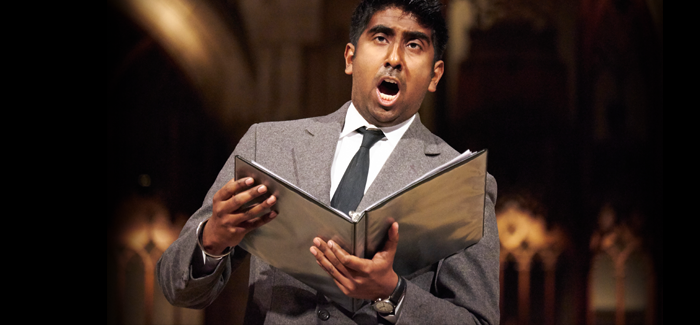
Opera singer Zeshan Bagewadi sings Ave Maria. (Photography by Joel Wintermantle)
A Rockefeller Chapel concert finds harmony in religious diversity.
On a Sunday afternoon in mid-November, just before the flurry of the holidays, a small crowd gathered in Rockefeller Chapel for a concert called Sounds of Faith. The blast of a Jewish shofar mingled with Muslim calls to prayer and the deep drone of Rockefeller’s organ. Chapel dean Elizabeth Davenport played a set of Tibetan singing bowls, while singers chanted the Hindu peace mantra, “Om shanti.”
And that was just the first number.
In 2009 Sounds of Faith debuted at Rockefeller Chapel—a DVD recording captured the occasion—as a performance of sacred music and spoken chants from Islam, Christianity, and Judaism. The concept is the invention of UChicago physician and associate professor emerita Shakeela Hassan, who traces it back several decades, to her medical residency at St. Mary of Nazareth Hospital on Chicago’s West Side. Every morning at five o’clock, the nuns would wake her for Mass. And every morning she would get dressed and make her way to the chapel. Sitting in the pews listening to the sisters’ Latin chants, she was deeply moved, she says, and reminded of the recitations from the Quran she grew up with as a Muslim in Hyderabad, India. “I had never felt more secure in my own faith,” she says, “and at the same time more open to the beauty and depth of the faith of others.” This is a story she tells often, about the nuns at St. Mary of Nazareth, their kindness and Christian hospitality and the beauty of their chants. It was the beginning of her obsession with sacred sounds as a unifying and clarifying human force.
[[{"type":"media","view_mode":"media_original","fid":"2189","attributes":{"alt":"","class":"media-image","height":"335","typeof":"foaf:Image","width":"460"}}]]
On the chancel steps, the Rockefeller Children’s Choir sings ‟Jubilate Deo” and the Israeli song ‟Zum Gali Gali.” (Photography by Joel Wintermantle)
This November’s concert marked the fifth anniversary of Sounds of Faith. In the intervening years, Hassan and her foundation, Harran Productions, have organized performances and related presentations around the country and in the Middle East. This year, for the first time, the concert included pieces from Hinduism and Buddhism, as well as the three Abrahamic religions. The Rockefeller Children’s Choir sang in Latin and Hebrew; UChicago’s Russian choir, Golosá—dressed in traditional kosovorotkas and stationed in the rear upper balcony—sang Rachmaninoff. There were rousing, joyful songs and gorgeous, elaborate chants and modern, almost pop-sounding, numbers (in particular, an arrangement for piano and percussion of a Hindi lyric poem called ‟Shaam”).
One of the afternoon’s most stirring moments, and perhaps one of its most emblematic, came about a third of the way through the concert, when Zeshan Bagewadi—an Indian American opera singer, Hindustani classical musician, and indie rock singer-songwriter—stepped to the microphone to announce a change in the lineup. “I just got the dispatch from my relatives in Ohio,” Bagewadi said, “that my grandmother is now on her deathbed.” Haltingly, he told the hushed audience a little bit about her, how she’d raised 10 children and had scores of grandchildren, how she’d lived through the partitioning of Pakistan and India, how she’d endured suffering and hardship, how she’d never lost her sense of humor. He asked for a round of applause to celebrate her life.
Bagewadi would have to cut short his part of the concert. But before he rushed away to his grandmother’s bedside in Ohio, he offered one song that had been scheduled for later in the program: ‟Ave Maria.” He wanted to sing it now in her honor. “I’ve sung this piece a couple of times,” he said, “but I must say that I’ve never felt more compelled to sing this piece than I do right now.” Then the music began, and for the next five minutes there wasn’t a single cough or shuffle from the audience as Bagewadi’s voice, heartbreakingly clear, rose and fell above the lilting organ.
